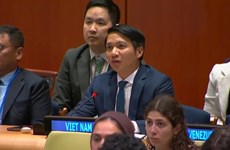Eat up: A global city mini case study
Far from being listed a good thing to do, wasting food still finds its way to Nguyen Thi Thu’s kitchen, a sin which Thu admits she has yet to figure out just one effective solution.
 Illustrative image (Photo: VNA)
Illustrative image (Photo: VNA)As an office worker for quite a while in Hanoi, the city of about 7.5 million citizens, Thu said her reasons for food waste were humanly simple. Eyes are always bigger than stomach. One step leads to another, and most of the time she found herself finally led head over heels in hesitancy to scraps. Food should be eaten up, Thu strongly agreed. But if her digestive system thought it had enough, no doubt would there be a battle.
Back into those days when Thu did not own a fridge, those leftovers would overnight end up in the rubbish-bin. Yet with the presence of modern technology, things turned out to be just the same thanks to a good rule of thumb: A fridge is everything but the magic to keep food fresh forever.
No way is the story shared by Thu the one and only. It instead goes beyond Hanoi’s boundaries and Thu is just one of many who partly intentionally or unintentionally contribute to the food waste issue, one of challenges faced today by cities over the world.
Figures from the United Nations Environment Assembly (UNEA) show that food loss and waste is a major global environmental issue, and it consumes about one-fourth of all water used by agriculture worldwide, uses cropland area the size of China and generates 8 percent of global gas emissions.
Every year, UNEA notices that, consumers in industrialized countries waste almost as much food as the entire net food production of sub-Sahara Africa (222 million vs. 230 million tonnes). The amount of food lost and wasted every year is equal to more than half of the world’s annual cereals crops (2.3 billion tonnes in 2009/10). Coming alarmingly like a ton of bricks but somehow these figures still feel far somewhere else away.
Ylona Veronica A. Bayod, Psychology Professor at Saint Louis University, the Philippines, shed some lights on the presented behaviour. According to her opinion, people waste food because they were never made aware of the importance of consuming one's food. In case they do waste, they were never punished for doing so.
Assuming ones who waste do know there are people dying from hunger but still, they waste food, Veronica said reasons range from lacking empathy, desensitized by the issues they see to never experiencing hunger. The fallacy of invulnerability, thinking "it won't happen to me" explains why people don't feel the risk, need and responsibility just and enough to save.
To people who say it’s difficult to change their wasting habit, the psychology professor found it hard to reach an agreement on that. From her point of view, no habits can not be changed, no attitudes can not be changed unless one has no wish for it.
Every person counts
At the 5th World Cites Summit (WCS) held in Singapore last month, leaders and mayors over the world came together to discuss challenges and solutions for liveable and sustainable cities. The sea is rising, the ice is melting, the heat is killing, the trees are disappearing, the storms are coming etc. Humans are being challenged like never before.
In that context, as important as the collaborative leadership which guides citizens to the future with open minds, long term attitudes, innovations which begin with crisis, talking and walking the talk, like never before is the role of individuals. So what can humans do to hopefully overcome these global chaos? According to Denmark’s Minister for Environment and Food Esben Lunde Larsen, changes must come at individual level as well on this global city journey.
As for dealing with food waste, Veronica suggested to make a difference with a strike at people’s pockets. By coming up with a rule of charging extra payment to unconsumed food, restaurants can manage to get people motivated to save food and change the way they think about wasting food. “Everybody at some point eats in a restaurant so by being aware of food waste by charging them extra somehow affects their consciousness on food waste”, she said.
In addition, she pointed to the parents who need to be educated so in return they can educate their children and be the role models for their kids who soon become productive members in the society that will declare an all-out war to food wastage.
Recently from the United States, there was one thing passionately said by First Lady Michelle Obama that could not be more true. “We can not sit back and hope everything works out for the best”. So next time when you find yourself alone facing a dish full of food, put up a fight and walk your talk.
There is no time like the present. At WCS in the firm belief, Singapore’s Prime Minister Lee Hsien Loong made an awakening on the process of global cities which couldn’t be blocked. “You have the talent to do it, but you have to decide what to do”, commented he./.













